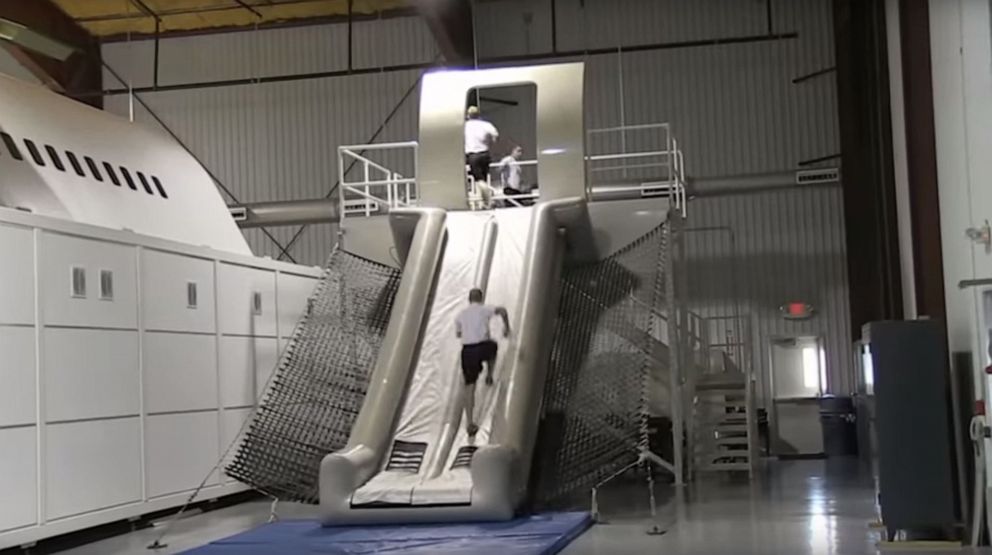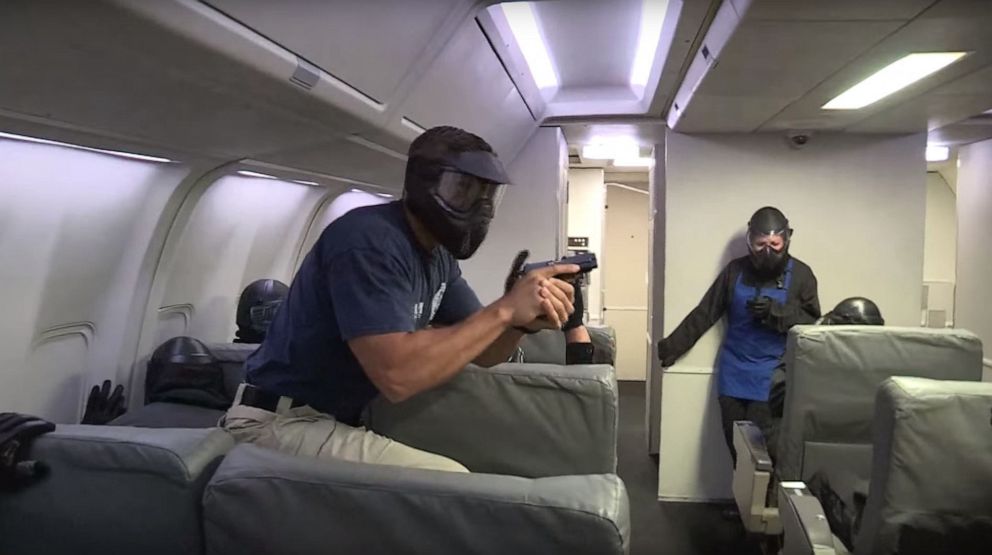'Tension, mistrust': The allegedly toxic relationship between federal air marshals and their supervisors
Years of tension have been brewing between air marshals and their bosses.
Federal air marshals have been suffering at the hands of many of their supervisors at the Federal Air Marshal Services (FAMS) and the Transportation Security Administration for years, union officials say, as conditions facing the elite group charged with safeguarding the nation’s skies have reached a crisis point.
The marshals have seen a rash of suicides, health problems and other issues in recent years that union leaders say are related to their working conditions, both in the air and on the ground. And at the heart of those working conditions appear to be years of tension between marshals and their supervisors.
In 2010, for instance, the Office of Inspector General at the Department of Homeland Security -- which oversees the TSA and FAMS -- launched an investigation after CNN published a leaked picture of a mock-“Jeopardy!” board based on the popular quiz show and created by an air marshal supervisor that appeared to make fun of African-Americans, gays and lesbians and other members of the agency.
While the resulting 2012 report, concluded that the 21-month investigation “does not support a finding of widespread discrimination and retaliation within FAMS,” it chronicled what appeared to be a deep animosity between flying air marshals and the supervisors that over their schedules.
"Federal air marshals repeatedly portrayed their supervisors as vindictive, aggressive, and guilty of favoritism," the report, which cited 40 federal lawsuits that had been filed by air marshals alleging retaliation and discrimination by superiors, concluded.
“One-quarter of respondents feel they have been discriminated against, 47% of respondents fear retaliation, and 55% believe favoritism is tolerated,” the report noted.
“There is a great deal of tension, mistrust, and dislike between non-supervisory and supervisory personnel in field offices around the country.”
In a TSA response to the 2012 OIG draft report, TSA officials acknowledged that "while OIG found no evidence of widespread retaliation or discrimination in FAMS, we understand the importance of OIG's additional findings that employees' perceptions of discrimination and retaliation are extensive and that limited transparency in management decisions and poor communication are at the center of these perceptions."
The TSA response also noted that the OIG report found "that the FAMS' mission performance was found to not be adversely affected," and contended that the report "notes that FAMS and TSA leadership have implemented numerous proactive measures to work on addressing the issues raised in the report."

‘A mistake’
In 2015, the U.S. Supreme Court ruled that an air marshal who had been fired after leaking an unclassified text message from supervisors at the TSA that he believed endangered U.S. commercial air security was covered by the federal Whistleblower Protection Act and must be reinstated.
In June, 2003, air marshals were alerted to a terrorist warning received by TSA from the Saudi government of an imminent “9/11 rerun,” a planned attack that government officials confirmed years later in a DHS report and a Central Intelligence Agency (CIA) Inspector General’s report --- a terror plot which was ultimately thwarted, according to the Government Accountability Project (GAP), a non-profit that supports whistleblowers.
Later that month, air marshal Robert MacLean and his colleagues were notified by a TSA text message that due to budget shortfalls, FAMS coverage of U.S. airlines requiring overnight stays would be cancelled for 60 days, until the end of that fiscal year. Fearing an imminent attack, MacLean leaked the text, and within 24 hours of the first news report about it, according to GAP, DHS officials cancelled the plan.
“Those actions were premature and a mistake by the people who were involved," a TSA spokesman said at the time, according to news reports.
Years later, when MacLean’s involvement in the leak surfaced, he was fired.
MacLean appealed his case for years, and In 2015, the U.S. Supreme Court ruled that MacLean, believing the threat endangered U.S. commercial air security, which prompted him to leak the story to a reporter -- was an act covered by the federal Whistleblower Protection Act. The SCOTUS ruling insisted that MacLean be reinstated.

‘Toxic combination’
Last fall, the powerful U.S. House of Representatives’ Committee on Oversight and Government Reform issued a pair of scathing reports following the committee’s three-year investigation into what it described as the “security deficiencies and personnel management practices in TSA.”
In two congressional reports -- one titled “Misconduct, Retaliation, and Obstruction at the Transportation Security Administration,” from the committee’s former Republican majority, and another called “Urgent Reforms Needed at TSA,” from the then-ranking minority member, Congressman Elijah Cummings, D-Md — lawmakers issued devastating critiques of the management practices at the TSA.
The committee’s investigation “revealed a pattern of mismanagement at TSA and DHS, including arbitrary and retaliatory personnel practices,” the Cummings report stated in its executive summary. “The lack of uniform civil service protections has led to numerous deviations from agency and deployment policy and from government-wide standards, which in turn has chilled whistleblowers, harmed morale, and negatively affected agency operations.”
The majority report concludes in its own executive summary that the “toxic combination of unchecked misconduct by senior officials and retaliation against rank-and-file whistleblowers undermined employee morale, reflected in the agency’s astronomical attrition rate (as high as 20 percent in some segments of the workforce) … and abysmal ranking in a government-wide job satisfaction survey (336 out of 339 agencies and components in 2017).”
In testimony provided as part of the Oversight Committee reports, Pekoske said that "[a]s TSA Administrator, I am committed to taking appropriate and swift action to address any reports of misconduct."
"There is a zero tolerance for egregious or offensive behavior under my tenure," he said in the statement, according to TSA officials. "The reported incidents of misconduct and retaliation occurred before my time at TSA, and in the interest of moving the organization forward, TSA has settled on some cases and considered previously levied punishments. TSA remains focused on securing the nation's transportation system guided by our core values of integrity, respect and commitment. "
"TSA holds its employees to the highest ethical standards and takes allegations of misconduct by its employees very seriously," the statement concluded. "Employees who are found responsible for misconduct are subject to discipline up to and including removal. TSA remains focused on securing the nation's transportation system guided by our core values of integrity, respect and commitment."
Even the TSA's ability to execute the fundamental job of protecting the flying public has come under scrutiny.
Undercover security tests initiated by the DHS in 2017 found that TSA inspectors and screeners, their equipment or their procedures failed "in the ballpark" of 80% of the time, a source familiar with the classified report told ABC News at the time. Two years earlier, ABC News had reported that secret teams from the DHS found that the TSA failed 95% of the time to stop inspectors from smuggling weapons or explosive materials through screening.
In a statement after the 2017 test results surfaced, the TSA said in a statement that it "concurs with the DHS OIG [Office of Inspector General] findings and is committed to aggressively implementing the recommendations."
'Absurd' classifications
The TSA has also drawn scrutiny for its standards of information classification. An ABC News investigation into the air marshal service describes a 2012 sleep study conducted by Harvard University sleep specialists and a 2014 training video that many air marshals said was unreasonably labeled SSI -- for Sensitive Security Information.
Numerous current and retired air marshals and union officials claimed that restricting the sleep study's publication was an effort to suppress the conclusion that their schedules should be federally-regulated like pilots, flight attendants and others.
TSA officials, who say they do use federal scheduling guidelines, declined to detail the scheduling guidelines because they are classified. The officials did not dispute the classification of the sleep study as SSI, but declined to say why it was originally categorized this way.
In 2017 testimony before the House Oversight committee, then-DHS Inspector General John Roth described an agency overly-focused on protecting its public image.
“We have found that TSA has a history of taking an aggressive approach to restricting information from being made public, especially with respect to a category of information known as sensitive security information … In addition to these inconsistent SSI designations, we have encountered instances in which the TSA redacted information so widely known that redaction bordered on absurd.”
Former Utah Republican Congressman Jason Chaffetz, who investigated FAMS and TSA as chairman of the Oversight committee, told ABC News that the DHS is “notorious” for unnecessarily classifying potentially embarrassing documents.
“Now that’s a problem,” Chaffetz said in an interview. “Believe me -- we ran into that buzz saw multiple times. Homeland Security is notorious for classifying things for what might be embarrassing information. That is a common practice and it’s wrong. They seem to have a culture of wanting to avoid all press inquiries. I think it’s systemic and I don’t think that has changed from one administration to the next. They just go to the mat and slap classified on anything embarrassing.”
The TSA issued a statement this week defending their practices in response to a detailed list of questions submitted by ABC News about the federal air marshals' schedules, physical and mental health issues and the reports and conclusions about FAMS and TSA management described in this story.
"Federal Air Marshals (FAMs) are a critical and successful part of TSAs layered approach to transportation security," the statement reads. "While FAA regulations, as they relate to airline pilots, do not apply to FAMs, scheduling parameters have been established using industry standards. TSA and the Federal Air Marshal Service (FAMS) continually review and assess how FAMs are deployed, understanding the impact of proper rest while providing world class security to the traveling public. The health and welfare of every man and woman who serves in the FAMS is TSA's highest priority. TSA and FAMS leadership take the care of every FAM very seriously and vigorously dispute any indication otherwise."
ABC News' Felisa Fine, Brad Martin, Natalie Savits and Carolyn Weddell contributed research to this report.




